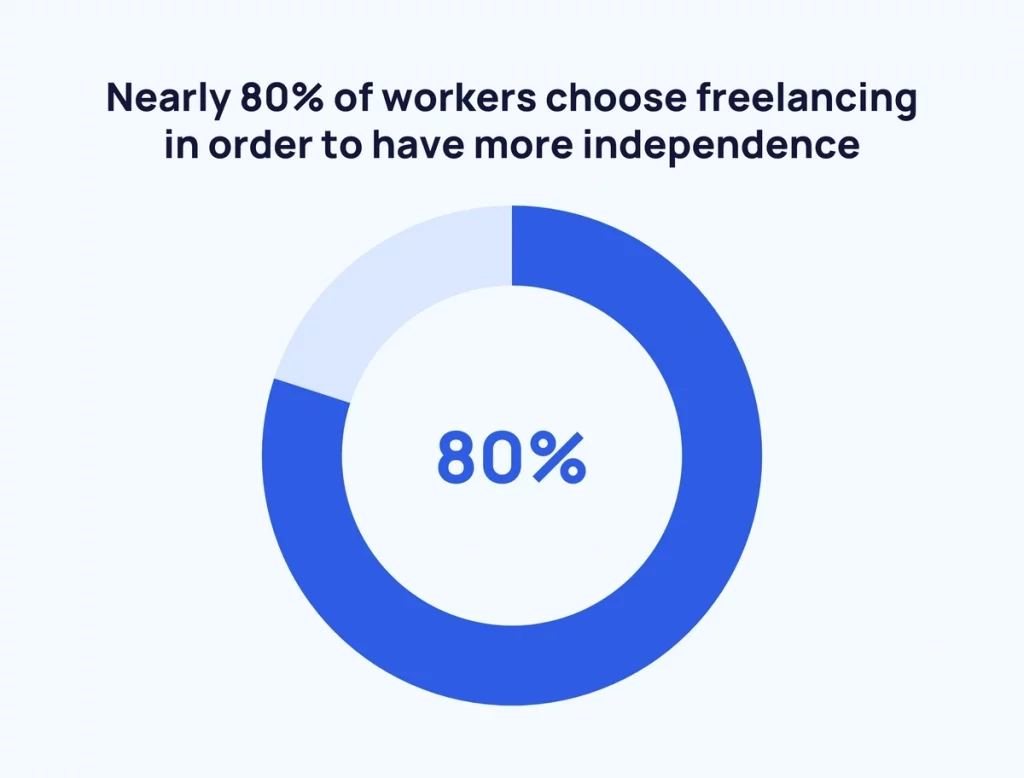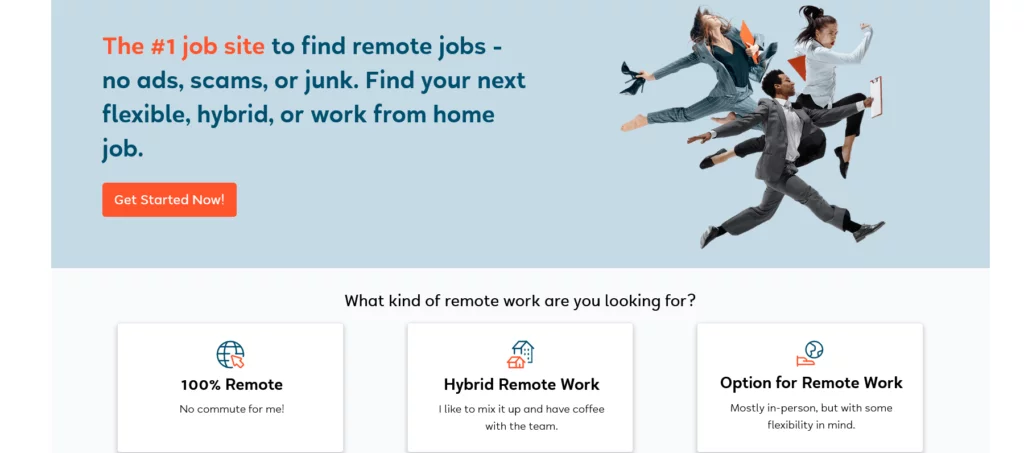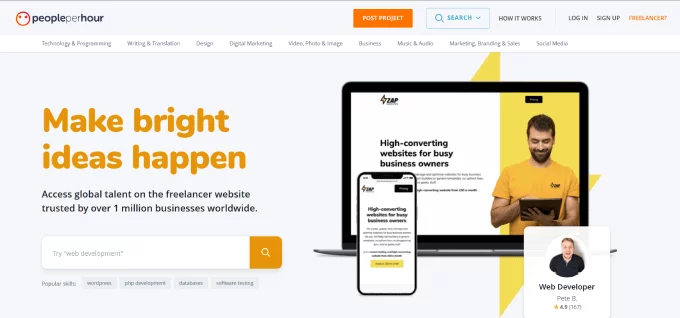Are you a freelancer on the lookout for the most effective website to bolster your workload?
Establishing a steady and trustworthy clientele is pivotal but often a challenging aspect of maintaining a thriving freelancing business. Freelance platforms offer a unique solution by acting as intermediaries that bridge the gap between freelancers and potential clients. These platforms serve as virtual marketplaces, presenting a myriad of opportunities directly to freelancers, sparing them the exhaustive efforts of self-promotion and marketing.
Navigating the freelance landscape can be daunting, but leveraging these websites can significantly ease the process. They provide freelancers with a centralized hub to showcase their skills, expertise, and services to a vast pool of potential clients actively seeking freelance talent.
Types of Freelancer Work Websites:

Freelance websites serve as dynamic online hubs that facilitate connections between skilled freelancers and businesses or clients seeking their expertise. These platforms come in two primary types, each offering unique avenues for freelancers to secure work and for clients to find suitable professionals:
- Bid-based Freelance Websites: Here, freelancers browse through a catalog of available projects posted by companies or individuals seeking specific services. As a freelancer, you submit proposals outlining your qualifications, rates, and how you can meet the project’s requirements. It’s a competitive yet proactive way to secure work based on your capabilities and terms.
- Marketplace-based Freelance Websites: In these platforms, freelancers set up profiles showcasing their skills, experiences, and services. Clients search for freelancers based on the specific services they require, evaluating profiles to hire individuals who align with their needs. It’s a more passive approach, where clients reach out to freelancers based on their listed expertise and past work.

Source: FirstSiteGuide
Key Features and Benefits of Freelance Websites:

Source: Payoneer
- Payment Processing: Many freelance websites facilitate secure transactions directly on their platform, offering a hassle-free payment process for freelancers. This eliminates concerns about invoicing or payment delays, ensuring smoother financial transactions.
- Communication Tools: Built-in messaging systems enable seamless communication between freelancers and clients without divulging personal contact details. This allows for efficient discussions, project updates, and clarifications without compromising privacy.
- Review and Rating Systems: These platforms often incorporate review and rating features, allowing both freelancers and clients to leave feedback based on their experiences. This feedback loop helps establish credibility and trust, enabling freelancers to build a reputable portfolio.
- Profile Showcasing: Freelancers can showcase their skills, portfolios, past projects, and client testimonials on their profiles. This acts as a comprehensive digital portfolio, attracting potential clients and illustrating the freelancer’s capabilities.
By utilizing these freelance websites, freelancers can benefit in numerous ways:
- Access to Opportunities: These platforms expand the reach of freelancers, providing access to a vast array of potential clients and projects.
- Streamlined Process: From project discovery to payment, these platforms centralize and simplify the freelance process, saving time and effort.
- Risk Mitigation: The review systems and payment security measures mitigate the risks associated with freelancing, fostering a safer and more reliable work environment.
Top Freelancer Work Websites:
1. Codeable

Codeable stands out as a platform tailored for WordPress developers seeking employment opportunities. Unlike other platforms, it meticulously manages the project-to-developer ratio, ensuring that all freelancers have fair chances to secure jobs.
Due to this commitment, Codeable often maintains a waiting list for new WordPress developers and programmers. Gaining entry, however, proves challenging due to the site’s stringent vetting process. This involves a comprehensive evaluation, encompassing written and live tests, a Skype interview, and a rigorous 45-day trial period where developers work on genuine projects under close scrutiny.
Once accepted, developers can expect projects spanning plugin development, theme creation, and online store setup. Notably, the platform offers certain advantages and drawbacks:
Pros:
- Guaranteed hourly rates ranging from $80 to $120 USD
- Support team assistance in managing challenging client relationships
- Access to a private community fostering idea exchange and skill-sharing sessions
Cons:
- Lack of control over setting individual rates
- Stringent selection criteria favoring highly skilled developers, potentially posing a challenge for beginners entering the software development field
Why Codeable is recommended: Most freelance platforms suffer from intense competition, resulting in a race to lower project prices. Codeable addresses this issue by presenting a single price to clients, regardless of how many experts propose estimates for the project. This price, calculated by a specialized algorithm, eliminates price undercutting and over-pricing, enabling clients to hire based on value rather than the lowest bid.
2. Toptal

Toptal prides itself on being an exceptionally exclusive freelance platform. Unlike other platforms inundated with less skilled freelancers and low-paying opportunities, Toptal has garnered acclaim by admitting only 3% of freelance talent.
The platform maintains its high standards by implementing a rigorous selection process. Prospective freelancers aiming to join Toptal undergo a meticulous screening involving skill assessments and language tests. The comprehensive skill review evaluates each applicant’s technical proficiency, ensuring that every member of the Toptal network excels in their respective field.
Once the exams are successfully completed, applicants must provide their contact details and resume. A representative from Toptal engages in discussions regarding the applicant’s skills and professional background.
Following the live screening, freelancers are presented with a test project, serving as the final evaluation to confirm compatibility with the Toptal network.
Pros:
- Access to highly exclusive and lucrative opportunities
- Absence of project fees for freelancers
- Ideal for proficient professionals such as designers, developers, finance experts, product management, and project managers
- Toptal curates quality clients, saving freelancers from sifting through low-paying gigs.
Cons:
- Requirement to pass a comprehensive screening process
- Limited diversity in job types available
Why Toptal is recommended: Toptal prioritizes ensuring freelancers are fairly compensated for their expertise. Their platform is strategically designed to connect freelancers with high-paying gigs. Toptal attracts reputable brands capable of investing in skilled freelancers, creating a mutually beneficial scenario for both parties.
Unlike many other freelance platforms, Toptal does not levy additional fees. Instead of deducting 20% of a freelancer’s fee like Upwork, Toptal adds its fee on top of the freelancer’s charges. For instance, if a freelancer charges $100 per hour, Toptal may bill the client $120, and the freelancer receives their full fee without deductions.
3. FlexJobs

FlexJobs operates on a membership-based model, focusing on curating flexible remote work opportunities spanning freelance, remote, part-time, and full-time positions. Whether you seek short-term assignments or aspire to embark on an entirely new freelance career, FlexJobs caters to your needs.
The platform boasts an extensive array of job listings, allowing users to filter based on industries, job types, recency, work flexibility, and more.
FlexJobs offers tiered membership plans with varying durations, priced as follows:
- 1 week – $9.95
- 1 month – $24.95
- 3 months – $39.95
- 1 year – $59.95
Notably, FlexJobs dedicates over 200 hours daily to research companies and meticulously vet job postings, ensuring a scam-free environment devoid of MLMs and commission-based roles.
Pros:
- Provides career guidance and skills testing to facilitate career launches
- Ensures every job listing undergoes verification to weed out scams
- Offers a diverse spectrum of job opportunities
- Paid subscription filters out low-quality job listings and potential scams
Cons:
- Implies a monthly fee even if job placement isn’t immediate
- Requires negotiation of rates with employers and clients
- Lacks payment guarantees and in-platform payment processing
Why FlexJobs comes recommended: FlexJobs garners favor for several reasons. Despite an initial membership cost, users gain unlimited access to a multitude of recent job postings, sans the extensive screening process evident in platforms like Toptal or Codeable.
Moreover, once you secure a client, you needn’t fret about the platform extracting service fees from your earnings, a common practice among most freelance websites. FlexJobs is highly recommended for individuals seeking clients and job opportunities while circumventing the scenario of a third-party platform taking a percentage cut from their earnings.
Learn about top SaaS business ideas here.
4. Upwork

Upwork stands as a prime platform within the freelance landscape, renowned for its mammoth size and multitude of opportunities, making it an ideal starting point for freelancers. With a staggering 12 million freelancers and a whopping 3 million jobs posted yearly, Upwork offers an expansive arena for job seekers to connect with potential clients.
What sets Upwork apart is its inclusivity across diverse industries. It spans broad categories encompassing finance, sales and marketing, writing, IT, design, translation services, and beyond. Even those with incredibly niche skills, such as white-board animators or job description writers, will find suitable opportunities on this platform. Featuring numerous sub-specialties, Upwork ensures freelancers with distinct talents can discover fitting job openings without much difficulty.
Pros:
- Abundance of job opportunities spanning various industries
- Wide selection of services and industries available for freelancers
- Seamless payment processes
- User-friendly interface with an integrated messaging app facilitating client communication
- Options to charge either a fixed price or hourly rates
Cons:
- Intense competition, particularly challenging for beginners in the field
- Upwork imposes a flat 10% service fee on all earnings generated on the platform
- Necessity to purchase ‘connects,’ tokens used for submitting proposals, with users initially receiving only 10 free connects per month
Why Upwork comes recommended: For freelancers embarking on their journey, Upwork emerges as an excellent initiation point. Its free entry and extensive job pool attract attention, despite the high competition. Although the platform hosts a substantial number of freelancers vying for opportunities, perseverance often pays off, enabling dedicated individuals to secure rewarding gigs.

5. Fiverr

Fiverr operates as a marketplace-oriented freelance platform, distinguished by its approach where clients seek out freelancers based on their profiles. Unlike Upwork, where freelancers apply for available jobs, Fiverr’s clients directly contact freelancers.
The sign-up process on Fiverr is straightforward. Freelancers can effortlessly create profiles and showcase the services they offer. They retain full autonomy over the services, service packages, and pricing structures they present.
Fiverr’s freelance marketplace accommodates various skill sets, catering to content writing services, data entry, design work, or even uniquely specialized talents.
However, Fiverr claims a significant 20% portion of freelancers’ earnings, which ranks relatively high among freelance platforms. While beneficial for visibility, especially for beginners, it might pose challenges for sustaining a full-time career.
Pros:
- User-friendly website and mobile app
- Withdrawals facilitated through PayPal
- Absence of monthly or sign-up fees
- Freelancers can offer diverse service packages and set their rates
Cons:
- Lower-paying gigs prevalent on the platform
- High fee deduction (20%)
- Payments subjected to a 14-day holding period
Why Fiverr is recommended: Fiverr serves as an ideal platform for individuals with unique talents that don’t align with traditional freelance categories. Under categories like social media marketing, Fiverr showcases a broad spectrum of specialized services. For instance, within this domain, freelancers offer expertise in digital marketing, crafting branded TikTok videos, optimizing Airbnb listings, or enhancing Instagram accounts—showcasing the diversity of talents and services available on the platform.
6. 99designs

99designs operates as an online marketplace facilitating connections between designers and clients in need of design services. The platform serves as a stage for freelance graphic designers to showcase their expertise, enabling clients to discover professionals perfectly suited for their project requirements.
This creative hub caters to an array of design projects encompassing websites, apps, logos, book covers, clothing, advertising, illustrations, and more.
However, 99designs does impose substantial deductions from earnings. There’s an initial 20% introduction fee deducted from the first $500 earned with a new client, capped at a maximum fee of $100. Additionally, designers are subject to service fees, with rates decreasing as designers progress through successful projects:
- Top-level designers incur a 5% service fee
- Mid-level designers encounter a 10% service fee
- Entry-level designers face a 15% service fee
Despite the high service fees, 99designs proves beneficial in securing design work that might be challenging to find on less specialized freelance platforms.
Pros:
- Tailored platform for skilled graphic and web designers
- Opportunities for earnings through individual projects or contest participation
- Trusted platform for businesses seeking diverse design services
Cons:
- Limited payment options available only through PayPal or Payoneer
- Earnings might only be acquired upon winning a contest, not just by submission
- Beginners with minimal design experience may face challenges in securing work
Why 99designs is recommended: What distinguishes 99designs is its provision of two earning avenues for freelancers. Designers can collaborate directly with clients on 1-to-1 projects or submit their designs to contests for potentially substantial earnings.
We highly recommend 99designs as the premier freelance platform for graphic designers and creatives. It garners trust from prominent brands, offering a higher likelihood of acquiring meaningful design projects compared to other platforms.
7. PeoplePerHour

PeoplePerHour stands as a UK-based platform where employers list projects and freelancers bid for job opportunities. This platform doesn’t specialize in any particular profession; instead, it serves as a melting pot for freelancers proficient in diverse fields like design, programming, legal services, and business.
Similar to Upwork, PeoplePerHour necessitates the creation of a freelance profile emphasizing individual skills. Upon account approval, freelancers receive 15 proposal credits per month. Any additional proposals beyond this allocation require a payment of £5.95 for every five extra submissions.
Pros:
- Tools facilitating automated invoice creation
- Secure payment processes
- Job listings personalized based on your location
Cons:
- No assurance of immediate account approval for new users
- Limited to 15 free proposal submissions monthly
- Moderated review for new accounts might cause delays in starting
- Some reported instances of low-quality job listings on the platform
Why PeoplePerHour is recommended: While PeoplePerHour might not outshine competitors like Upwork and Fiverr, it still presents a substantial pool of job opportunities. For freelancers residing abroad and not demanding the higher rates typical of US workers, PeoplePerHour remains a viable choice despite its comparative shortcomings.
8. Wellfound

Wellfound, previously known as AngelList Talent, specializes in connecting freelancers with positions at startup companies.
Embracing an opportunity at a startup often grants freelancers the potential for greater impact and a more substantial creative footprint compared to established businesses. This platform has earned the trust of some of the world’s most innovative startups, including notable names like Airtable, Gusto, Nerd Wallet, Open AI, and others. With a vast pool of over 130,000 tech jobs, freelancers are bound to discover roles that align with their aspirations.
The job categories encompass engineering, product development, design, data and analytics, sales, marketing, operations, HR and recruiting, finance, and legal roles.
Pros:
- Chance to make a significant difference within a startup environment
- Streamlined profile setup and application process
- Access to job details such as probable salary and stock options
- No requirement for cover letters in the application process
Cons:
- Focuses predominantly on startups; may not suit those seeking opportunities in other business structures
- Some roles labeled as entry-level might demand substantial prior experience
Why WellFound is recommended: Working within a startup setting provides freelancers the chance to collaborate, contribute creatively to processes, and play a part in shaping a brand’s identity. This unique dynamic often resonates with freelancers seeking a more impactful and engaging work experience.
Factors to Consider Before Choosing a Freelance Website:
- Local vs. Global Opportunities: Before committing to a freelance platform, evaluate the nature of your services. Are they better suited for local, in-person engagements or do they thrive in an online setting? For instance, services like photography often benefit from platforms that offer local gig opportunities, fostering connections within the community.
- Specialization and Industry Focus: Freelance websites vary in their specialization, catering to specific industries or offering a broader range of services. For instance, platforms like Codeable focus on WordPress development, while others embrace a wider spectrum. It’s crucial to align your expertise with a platform that supports your domain, ensuring relevant opportunities aligned with your skills.
- Volume of Job Offers: The platform’s popularity often correlates with the number of job postings available. A more widely-used site typically hosts a higher volume of job offers, providing a broader pool of opportunities for freelancers. Assessing the platform’s user base and job listings can give insights into potential opportunities available to you.
- Service Fees and Revenue Sharing: Understanding the fee structure is vital. Some platforms deduct a percentage from your earnings as service fees. For instance, while Fiverr and Upwork levy a 20% fee, others like Codeable have a lower fee of 10%. Being aware of these fees is crucial in determining the actual revenue you’ll earn from your services.
- Community and Support: Consider the community aspect of the platform. Does it offer adequate support, resources, or forums where freelancers can network, seek advice, or collaborate? A vibrant community can offer valuable insights, support, and networking opportunities beneficial for your freelance journey.
Conclusion:
Navigating the complexities of freelance websites demands a delicate equilibrium between various elements: specialization, opportunities, fees, and community support. It’s crucial to strike this balance effectively to propel your freelance career forward.
By selecting platforms that align with your expertise, cater to your preferred working style, and offer a supportive community, you lay the foundation for a thriving freelance journey. These platforms become not just venues for work but nurturing grounds for growth and collaboration.
FAQs on Freelance Websites:
How much do freelance websites typically charge as service fees?
Service fees vary; some deduct a percentage (e.g., 20% on Fiverr or Upwork), while others charge a lower percentage or fixed fees.
What if my specialization doesn’t fit into a specific industry?
Explore platforms with a broader range of services or those accommodating diverse skill sets to find opportunities matching your unique talents.
Can I use multiple freelance websites simultaneously?
Yes, you can leverage multiple platforms to expand your opportunities and diversify your client base, provided you manage your workload effectively.



